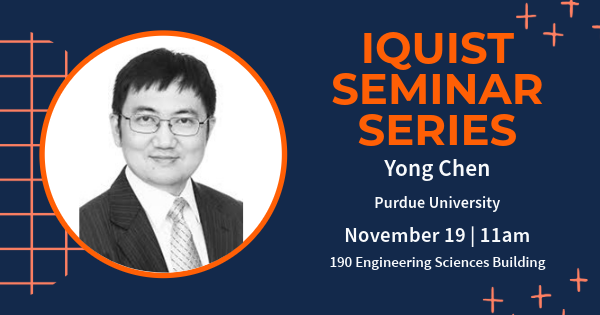IQUIST Seminar: "Making and measuring quantum matters - some new spins," Yong Chen, Purdue University

- Sponsor
- IQUIST
- Speaker
- Yong Chen, Professor, Purdue University
- Contact
- Stephanie Gilmore
- stephg1@illinois.edu
- Views
- 253
Making and measuring quantum matters - some new spins
Abstract: Spin is one of the simplest yet most powerful quantum properties that can be potentially harnessed for various quantum technologies. Many quantum materials (magnets, superconductors, topological materials etc.) and artificial/synthetic quantum mattes (NV centers, quantum gases) possess interesting spin degrees of freedom. Interfacing different “spintronic” quantum matters can allow us to realize hybrid quantum systems with novel emerging properties, and develop new measurement techniques to probe quantum correlation or entanglement in quantum matters. I will discuss two exemplary classes of “spintronic” quantum matters – “exotic magnets” (ranging from “Moire magnet” to “quantum spin liquids”) with unusual spin-position correlation/entanglement, and topological insulators/superconductors with unusual spin-momentum correlation/entanglement. An emerging experimental frontier, interfacing “quantum materials” and “quantum information”, is to use qubit-like probes and related tools to perform new ways of measurements such as “quantum sensing” on quantum materials, that can characterize the non-local many-body entanglement and detect exotic quasiparticles (such as non-Abelian anyons). Time allows, I may discuss some additional questions and directions, motivated by developments from atomic/molecular/optical physics, where coherent coupling between spin states of atoms are used to control quantum chemistry and engineer novel quantum matters.
Bio: Yong P. Chen received his BSc and MSc degrees in mathematics from Xi'an Jiaotong University and MIT, and PhD in Electrical Engineering from Princeton University. After doing a postdoc at Rice University, he joined the faculty of Purdue University in 2007 and is currently the Karl Lark-Horovitz Professor of Physics and Astronomy and Professor of Electrical & Computer Engineering, Director of Purdue Quantum Science and Engineering Institute, and Director of Center for Quantum Technologies, an NSF Industry-University-Cooperative-Research-Center (IUCRC). He has also held various international affiliated faculty and research appointments, such as a Villum Investigator and part-time Professor in Aarhus University, Denmark, and a principal investigator in the Advanced Institute for Materials Research in Tohoku University, Japan. His lab studies both solid state quantum materials and devices based on 2D and topological materials, and synthetic quantum matters made of cold atoms and molecules. He is a recipient of Masao Horiba Award, NSF CAREER Award, ACS and DOD Young Investigator Award, IBM Faculty Award and McCoy Award, and an elected Fellow of American Physical Society. He is also currently serving as a commissioner in International Union for Pure and Applied Physics (IUPAP), and the Purdue site PI and Governance Advisory Board (GAB) member for Quantum Science Center, a Department of Energy Quantum Information Science Research Center headquartered at Oak Ridge National Lab (ORNL).
To watch online go to the IQUIST youtube channel: https://www.youtube.com/channel/UCCzAySwQXF8J4kRolUzg2ww
For Zoom link you may check the IQUIST calendar weekly email or contact Stephanie Gilmore (stephg1@illinois.edu). To subscribe to our weekly email for event announcements, please go to https://lists.illinois.edu/lists/subscribe/iquist-announcements.